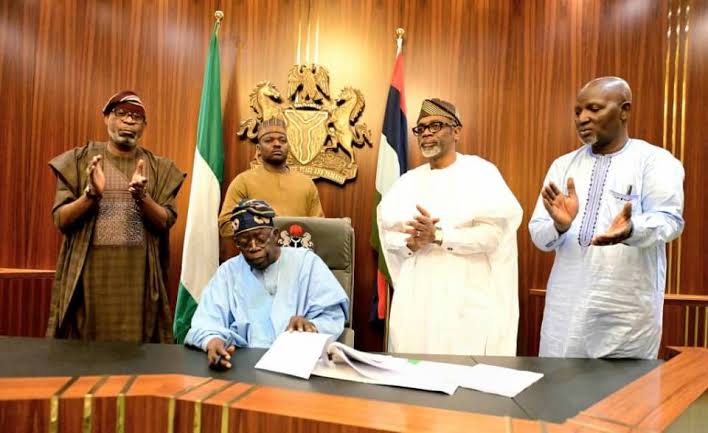In the political landscape of Nigeria, few topics have garnered as much consistent attention from a single figure as the issue of student loans has from President Bola Ahmed Tinubu. His journey with this pivotal policy began in earnest during his 2014 presidential campaign, where he first vocalized the need for a student loan system to bolster higher education access for all Nigerians.
Fast forward to his 2023 campaign, and the promise was not only reiterated but was also placed at the forefront of his agenda. True to his word, upon assuming office, President Tinubu wasted no time in transforming his long-standing commitment into tangible action. In June 2023, he signed the Student Loans Bill into law, a move that was met with widespread acclaim for its potential to alleviate the financial burdens faced by countless Nigerian students.
However, the journey did not end there. Recognizing the need for refinement, President Tinubu, in a display of unwavering dedication, re-enacted the law with amendments in 2024 to ensure its effective implementation. This recent development underscores his resolve to not only envision but also actualize a robust framework that empowers the nation’s youth through education.
President Tinubu’s steadfastness on the student loan initiative paints the portrait of a leader who is not only a visionary but also strong-willed in his pursuit of educational reform. His actions reflect a deep-seated belief in the transformative power of education and a commitment to the future of Nigeria’s next generation. As the amended law takes effect, it stands as a testament to President Tinubu’s enduring legacy in the realm of educational policy and his unwavering advocacy for the Nigerian student.
The concept of student loans in Nigeria is not novel, having been introduced in the 1970s under the administration of Yakubu Gowon. However, the initiative faced challenges and was not sustained. It was during Tinubu’s 2014 presidential campaign that the idea resurfaced with vigor. Tinubu spoke passionately about the need for an education financing system that would ensure no Nigerian was denied the opportunity to pursue higher education due to financial constraints.
This vision was rooted in the recognition of education as a critical driver of personal and national development. Tinubu’s proposal aimed to create a sustainable and equitable funding mechanism that would support students and, by extension, contribute to the nation’s socio-economic growth.
The signing of the Student Loans Bill into law in June 2023 marked a significant milestone in Tinubu’s student loan journey. The law aimed to provide interest-free loans to indigent Nigerian students, enabling them to cover their tuition fees in government-owned higher institutions. The eligibility criteria were carefully crafted to ensure that the loans would benefit those most in need, with provisions such as income caps for applicants’ parents and the requirement for guarantors.
The law also addressed the repayment structure, mandating that beneficiaries begin repaying the borrowed sum two years after completing their mandatory national service. This thoughtful approach was designed to give graduates a grace period to establish themselves professionally before taking on the responsibility of loan repayment.
Despite the initial success, it became apparent that the law required amendments to enhance its effectiveness. In 2024, President Tinubu demonstrated his responsive leadership by re-enacting the law with necessary adjustments. The amendments aimed to address practical concerns and ensure that the student loan scheme was more inclusive and better aligned with the realities of Nigeria’s diverse student population.
The re-enacted law expanded the scope of the scheme to accommodate not just university students but also those pursuing vocational and technical education. This inclusive approach acknowledged the varied educational paths that Nigerian youth might take and the importance of supporting all forms of skill acquisition.
President Tinubu’s administration has not limited its focus to student loans alone. A broader educational reform agenda has been set in motion, aiming to overhaul the entire sector. This includes a comprehensive review of the curriculum at all levels to align academic studies with industry demands, thus preparing students for the modern job market.
The administration has also advocated for increased collaboration between the government and private sector stakeholders. This partnership is crucial for addressing challenges such as funding, teachers’ capacity building, and graduate employment. By fostering a synergy between education and industry, the Tinubu administration is laying the groundwork for a more dynamic and prosperous future for Nigeria.
President Tinubu’s unwavering commitment to the student loan initiative and broader educational reforms reflects his understanding of the pivotal role education plays in nation-building. His tenacity in championing these causes, from their inception as campaign promises to their realization as national policies, showcases his dedication to empowering Nigerian youth and investing in the country’s future.
As the amended Student Loan law comes into effect, it stands as a symbol of hope for many aspiring students across Nigeria. It is a promise kept, a vision realized, and a legacy that will resonate for generations to come. President Tinubu’s journey with student loans is more than a political narrative; it is a testament to the power of steadfast leadership and the transformative potential of education.

